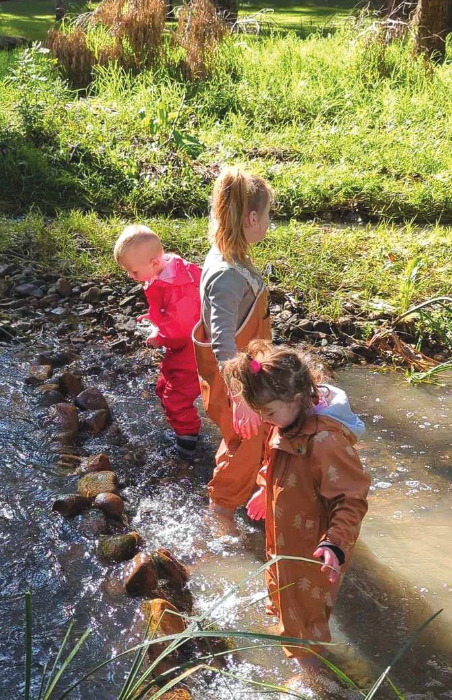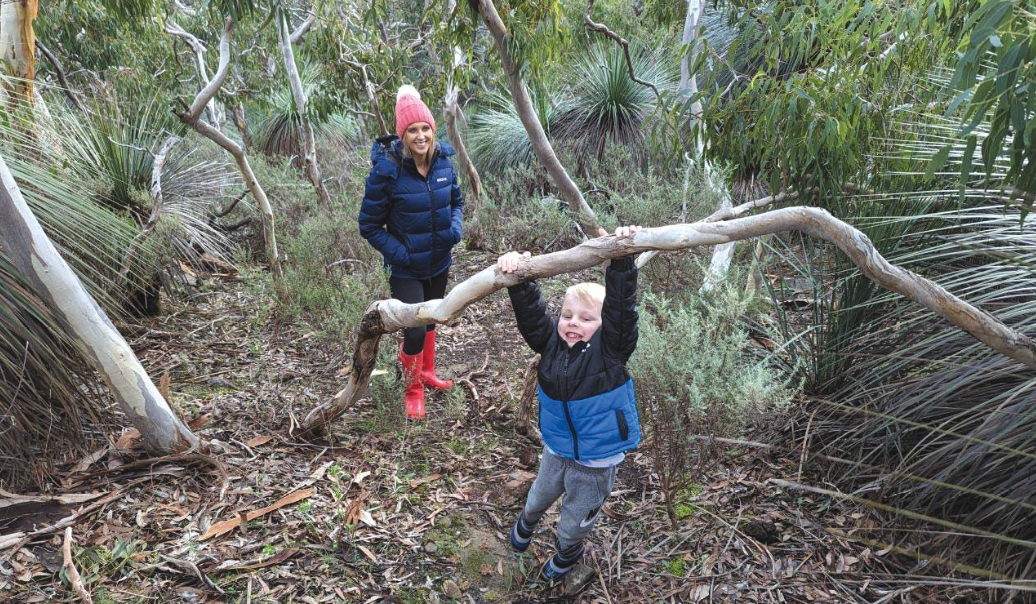
Nature-based play and learning have grown significantly in popularity over recent years, with nature-based Early Childhood Education and Care (ECEC) programs capturing the attention of families and educators across Australia, Katie Fotheringham writes.
University of South Australia researcher and PhD candidate Kylie Dankiw recently explored parent and early childhood education and care (ECEC) professionals’ perspectives of unstructured nature play by interviewing ECEC staff and parents.
Dankiw said the concept is simple – nature play is fundamentally about playing with, and, in nature.
“Broadly speaking, nature play is about getting dirty, making mud pies, cubby houses from sticks, exploring a creek bed or climbing trees – or whatever a child chooses to do,” Dankiw said.
“One interesting finding from our research highlighted that for staff, nature play spaces can be mixed play spaces, with aspects of artificial features balanced with natural features.
“ECEC staff described how nature play can be used to offset technology use, such as TV and screens, resulting in children forming a connection to the natural world where they can learn about sustainable practices,” she said.
Boosting children’s outcomes
With many early childhood settings transforming play environments to incorporate natural elements, the rise in popularity may be attributed to growing research that nature play provides children with numerous health and developmental benefits.
A recent study from Deakin University found preschool aged children who participate in “bush kinder” programs could have better education outcomes than those who stay indoors – with children who attended those programs building a deeper understanding of science, technology, engineering and maths (STEM).
Deakin School of Education research fellow Chris Speldewinde said girls in particular benefitted from engaging in non-gendered outdoor play because it allowed greater freedom to play creatively with unstructured natural features.
“Unstructured, outdoor play allows girls and boys to put away their dolls and stuffed toys and interact creatively with the environment around them to learn crucial STEM fundamentals,” Speldewinde said.
Employee perspectives on nature play
While there is growing research about the benefits of nature play to children’s health and development, Dankiw’s research aims to address the knowledge gap in how staff experience and are supported to foster nature play at work.
Dankiw said staff act as important gatekeepers when it comes to nature play, and while they can see the benefits firsthand, they may be presented with challenges when encouraging unstructured nature play.
“During the interviews, they consistently described how engaging in nature play activities is beneficial for children’s overall health and development – specifically, learning outcomes, developing a sense of self, physical, emotional, and cognitive development such as imagination and creativity,” she said.
“These staff also described several barriers that influence their engagement with nature play, such as weather (cold, rain, extreme heat in summer), institutional challenges relating to following safety regulations, having to clean and maintain the play space, and having enough time in the day to do so.
“The findings suggest that parents and staff may need additional resources and guidance on how to engage with nature play and overcome barriers within early childhood settings and the home environment,” Dankiw said.
Balancing risks and benefits
For workers in the sector who are already faced with growing workloads and increased bureaucratisation within their roles, the unstructured, risky and messy nature of this kind of play may be off-putting without access to adequate support or training.
“Our research found that often staff feel conflicted – they want to provide these experiences but feel they need to listen to what the parent wants whilst adhering to the safety regulations of the institution,” Dankw said.
“Staff highlighted that it is important to educate parents and institutions about the real versus perceived risks and to communicate the benefits on how they alleviate real risks instead of removing them completely.
“During our interviews, we also found that scheduling nature play experiences can be challenging when other important tasks compete for staff’s time, such as cleaning, supervising and admin work,” Dankiw said.
Strategies for embracing nature play
Dankiw said staff who participated in her research outlined strategies that may help parents and institutions embrace nature play.
“Some strategies include making sure children have appropriate wet weather gear (rain jackets, gum boots), play space upgrades, having resources available in inclement weather such as spare clothes and communicating the sensory benefits of mud and water play for children’s development,” Dankiw said.
“Parents and ECE staff alike highlighted that nature play can be indoors as well, and being able to deliver nature play indoors might be a great option when faced with weather challenges.
“To address time constraints, it may be useful for educational leaders to revise their scheduling structures to create dedicated time for nature play,” she said.
Dankiw said involving parents in conversations about nature play could also help mitigate the perception of nature play as a risky activity, with fears of child injuries and liability found to be the main deterrents to engaging.
“Enhancing communication between staff, parents and within institutions can be achieved by engaging in open discussions or forums regarding nature play programming, risk assessments, and play space upgrades within their centres or schools,” Dankiw said.
“By involving parents, educational leaders and institutions in this process and seeking their support, we can foster community involvement and collaboration in promoting nature play for the wellbeing of children,” she said.
Importance of relevant PD
Dankiw said undertaking nature play-related personal development (PD) may also enhance the practice and minimise risks for staff.
“Educational leaders may be able to enhance training and resourcing efforts by building partnerships with local nature play organisations, thereby leveraging their expertise and resources to support their professional development,” Dankiw said.
“These partnerships can help provide support in terms of facilitating nature play experiences, training staff on the safe delivery of nature play and building educator knowledge,” she said.
“Nature Play Australia has some great online resources for staff to help guide nature play delivery, such as guidance documents for creating nature play spaces and professional learning opportunities in the form of workshops and seminars.
“The PD aims to build staff knowledge and confidence to deliver an outdoor learning curriculum and explore important topics like risk, wellbeing and belonging,” Dankiw said.
Read Dankiw’s study at: journals.plos.org/plosone/article?id=10.1371/journal.pone.0286468
New Bluey nature play resources
ABC Kids have just released a suite of resources for early education based around everyone’s favourite cartoon dog, Bluey.
The resources include creative ideas for incorporating Bluey episodes into ECEC nature play planning and practice.
The resources can be accessed at:
www.abc.net.au/abckids/early-education/bluey-early-education-resources/nature-play




































































































































